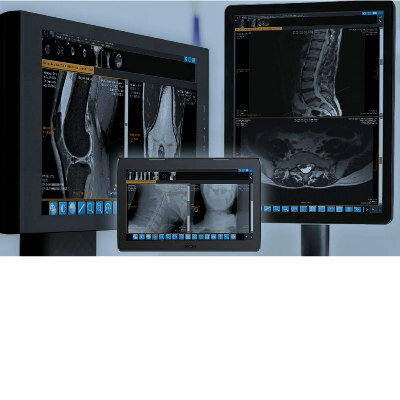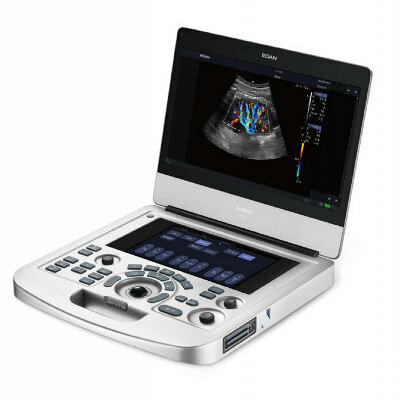Siemens Healthineers Introduces SOMATOM On.site Mobile Head CT Scanner and AI-based MRI Assistants at RSNA
|
By MedImaging International staff writers Posted on 03 Dec 2019 |

Image: Somatom On.site (Photo courtesy of Siemens Healthineers)
Siemens Healthineers (Erlangen, Germany) presented its new mobile head CT scanner, Somatom On.site and introduced artificial intelligence (AI)-based software assistants for magnetic resonance imaging (MRI) at RSNA 2019.
Siemens Healthineers’ new Somatom On.site mobile CT system allows the scanner to be taken to the ICU so that patients can be examined from their bedside, instead of transferring patients to the radiology department for a CT scan. Patients no longer have to be swapped from fixed devices (such as ventilators) to portable ones, then transport and scan the patient, then reattach the fixed devices. This removes the need for complicated patient transportation that involves multiple staff members and a high risk for the patient, thus revolutionizing scanning for intensive-care patients with skull and brain disorders.
Somatom On.site’s mobile concept includes a camera that displays the area in front of the device in real time on the integrated touchscreen. Users are supported by a motorized scanner trolley that enables intuitive and precise deployment in small spaces, and does not move during imaging, which prevents motion-induced image artifacts. Somatom On.site also features a revolutionary usability concept, the myExam Companion which guides users of all levels of experience through neuro exams and helps them achieve consistent results for diagnosis.
“For us, Somatom On.site is a fundamentally new approach to performing CT head scans for patients in intensive care. The combination of mobility, user-friendliness, and consistent image quality enables unprecedented levels of patient safety. At the same time, healthcare providers can make even more optimal use of their staff and CT fleet,” said Philipp Fischer, Head of Computed Tomography at Siemens Healthineers.
At RSNA 2019, Siemens Healthineers also introduced two software assistants based on AI that are designed to free radiologists from the burden of performing routine activities during MRI examinations in the body regions brain and prostate. AI-Rad Companion Brain MR for Morphometry Analysis automatically segments the brain in MRI images, measures brain volume, and marks volume deviations in result tables used by neurologists for diagnosis and treatment. AI-Rad Companion Prostate MR for Biopsy Support automatically segments the outer contour of the prostate on MRI images and enables radiologists to mark lesions, making it easier for their colleagues in urology to perform targeted prostate biopsies. Both the applications can be used on MRI scanners from different manufacturers and are available on teamplay, the cloud-based healthcare platform from Siemens Healthineers.
“With the new AI-based assistants, we are expanding our diagnostic offering to help our customers increase efficiency and improve the quality of care. We firmly believe that AI will help physicians deal with their workload and benefit patients by helping achieve an improved, patient-focused decision-making process,” said Peter Koerte, Head of Digital Health at Siemens Healthineers.
Related Links:
Siemens Healthineers
Siemens Healthineers’ new Somatom On.site mobile CT system allows the scanner to be taken to the ICU so that patients can be examined from their bedside, instead of transferring patients to the radiology department for a CT scan. Patients no longer have to be swapped from fixed devices (such as ventilators) to portable ones, then transport and scan the patient, then reattach the fixed devices. This removes the need for complicated patient transportation that involves multiple staff members and a high risk for the patient, thus revolutionizing scanning for intensive-care patients with skull and brain disorders.
Somatom On.site’s mobile concept includes a camera that displays the area in front of the device in real time on the integrated touchscreen. Users are supported by a motorized scanner trolley that enables intuitive and precise deployment in small spaces, and does not move during imaging, which prevents motion-induced image artifacts. Somatom On.site also features a revolutionary usability concept, the myExam Companion which guides users of all levels of experience through neuro exams and helps them achieve consistent results for diagnosis.
“For us, Somatom On.site is a fundamentally new approach to performing CT head scans for patients in intensive care. The combination of mobility, user-friendliness, and consistent image quality enables unprecedented levels of patient safety. At the same time, healthcare providers can make even more optimal use of their staff and CT fleet,” said Philipp Fischer, Head of Computed Tomography at Siemens Healthineers.
At RSNA 2019, Siemens Healthineers also introduced two software assistants based on AI that are designed to free radiologists from the burden of performing routine activities during MRI examinations in the body regions brain and prostate. AI-Rad Companion Brain MR for Morphometry Analysis automatically segments the brain in MRI images, measures brain volume, and marks volume deviations in result tables used by neurologists for diagnosis and treatment. AI-Rad Companion Prostate MR for Biopsy Support automatically segments the outer contour of the prostate on MRI images and enables radiologists to mark lesions, making it easier for their colleagues in urology to perform targeted prostate biopsies. Both the applications can be used on MRI scanners from different manufacturers and are available on teamplay, the cloud-based healthcare platform from Siemens Healthineers.
“With the new AI-based assistants, we are expanding our diagnostic offering to help our customers increase efficiency and improve the quality of care. We firmly believe that AI will help physicians deal with their workload and benefit patients by helping achieve an improved, patient-focused decision-making process,” said Peter Koerte, Head of Digital Health at Siemens Healthineers.
Related Links:
Siemens Healthineers
Latest RSNA 2019 News
- Carestream Introduces Three-Dimensional Extension of General Radiography Through Its Digital Tomosynthesis Functionality
- Lunit Demonstrates Latest Updated AI Solutions for Chest and Breast Radiology at RSNA 2019
- Bracco Diagnostics Unveils Contrast Media and Device Offerings at RSNA 2019
- Guerbet Showcases New Dose&Care and Other Digital Solutions with Diagnostic and Interventional Imaging Offerings
- Canon Introduces New Wireless Detectors and Digital PET/CT Scanner at RSNA 2019
- Hologic Launches Unifi Workspace, Comprehensive Reading Solution for Breast Health Diagnostics
- Agfa Launches New Groundbreaking Digital Radiography Unit at RSNA 2019
- Fujifilm SonoSite Exhibits Complete Point-of-Care Ultrasound Portfolio at RSNA 2019
- Fujifilm Previews World's First Glass-Free Digital Radiography Detector at RSNA 2019 Image
- NVIDIA Showcases Latest AI-driven Medical Imaging Advancements at RSNA 2019
- Philips Healthcare Demonstrates How AI Breast Software Brings Intelligence and Automation to Breast Ultrasound
- Siemens Healthineers Focuses on Digital Transformation of Imaging and Therapy at RSNA 2019
Channels
Radiography
view channel
Novel Breast Imaging System Proves As Effective As Mammography
Breast cancer remains the most frequently diagnosed cancer among women. It is projected that one in eight women will be diagnosed with breast cancer during her lifetime, and one in 42 women who turn 50... Read more
AI Assistance Improves Breast-Cancer Screening by Reducing False Positives
Radiologists typically detect one case of cancer for every 200 mammograms reviewed. However, these evaluations often result in false positives, leading to unnecessary patient recalls for additional testing,... Read moreMRI
view channel
PET/MRI Improves Diagnostic Accuracy for Prostate Cancer Patients
The Prostate Imaging Reporting and Data System (PI-RADS) is a five-point scale to assess potential prostate cancer in MR images. PI-RADS category 3 which offers an unclear suggestion of clinically significant... Read more
Next Generation MR-Guided Focused Ultrasound Ushers In Future of Incisionless Neurosurgery
Essential tremor, often called familial, idiopathic, or benign tremor, leads to uncontrollable shaking that significantly affects a person’s life. When traditional medications do not alleviate symptoms,... Read more
Two-Part MRI Scan Detects Prostate Cancer More Quickly without Compromising Diagnostic Quality
Prostate cancer ranks as the most prevalent cancer among men. Over the last decade, the introduction of MRI scans has significantly transformed the diagnosis process, marking the most substantial advancement... Read moreUltrasound
view channel
Deep Learning Advances Super-Resolution Ultrasound Imaging
Ultrasound localization microscopy (ULM) is an advanced imaging technique that offers high-resolution visualization of microvascular structures. It employs microbubbles, FDA-approved contrast agents, injected... Read more
Novel Ultrasound-Launched Targeted Nanoparticle Eliminates Biofilm and Bacterial Infection
Biofilms, formed by bacteria aggregating into dense communities for protection against harsh environmental conditions, are a significant contributor to various infectious diseases. Biofilms frequently... Read moreNuclear Medicine
view channel
New SPECT/CT Technique Could Change Imaging Practices and Increase Patient Access
The development of lead-212 (212Pb)-PSMA–based targeted alpha therapy (TAT) is garnering significant interest in treating patients with metastatic castration-resistant prostate cancer. The imaging of 212Pb,... Read moreNew Radiotheranostic System Detects and Treats Ovarian Cancer Noninvasively
Ovarian cancer is the most lethal gynecological cancer, with less than a 30% five-year survival rate for those diagnosed in late stages. Despite surgery and platinum-based chemotherapy being the standard... Read more
AI System Automatically and Reliably Detects Cardiac Amyloidosis Using Scintigraphy Imaging
Cardiac amyloidosis, a condition characterized by the buildup of abnormal protein deposits (amyloids) in the heart muscle, severely affects heart function and can lead to heart failure or death without... Read moreGeneral/Advanced Imaging
view channel
New AI Method Captures Uncertainty in Medical Images
In the field of biomedicine, segmentation is the process of annotating pixels from an important structure in medical images, such as organs or cells. Artificial Intelligence (AI) models are utilized to... Read more.jpg)
CT Coronary Angiography Reduces Need for Invasive Tests to Diagnose Coronary Artery Disease
Coronary artery disease (CAD), one of the leading causes of death worldwide, involves the narrowing of coronary arteries due to atherosclerosis, resulting in insufficient blood flow to the heart muscle.... Read more
Novel Blood Test Could Reduce Need for PET Imaging of Patients with Alzheimer’s
Alzheimer's disease (AD), a condition marked by cognitive decline and the presence of beta-amyloid (Aβ) plaques and neurofibrillary tangles in the brain, poses diagnostic challenges. Amyloid positron emission... Read more.jpg)
CT-Based Deep Learning Algorithm Accurately Differentiates Benign From Malignant Vertebral Fractures
The rise in the aging population is expected to result in a corresponding increase in the prevalence of vertebral fractures which can cause back pain or neurologic compromise, leading to impaired function... Read moreImaging IT
view channel
New Google Cloud Medical Imaging Suite Makes Imaging Healthcare Data More Accessible
Medical imaging is a critical tool used to diagnose patients, and there are billions of medical images scanned globally each year. Imaging data accounts for about 90% of all healthcare data1 and, until... Read more
Global AI in Medical Diagnostics Market to Be Driven by Demand for Image Recognition in Radiology
The global artificial intelligence (AI) in medical diagnostics market is expanding with early disease detection being one of its key applications and image recognition becoming a compelling consumer proposition... Read moreIndustry News
view channel
Bayer and Google Partner on New AI Product for Radiologists
Medical imaging data comprises around 90% of all healthcare data, and it is a highly complex and rich clinical data modality and serves as a vital tool for diagnosing patients. Each year, billions of medical... Read more






















